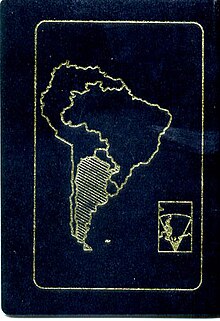Argentine passport
| Argentine passport | |
|---|---|
 The front cover of the previous Argentine passport (now they are biometric), featuring its Mercosur blue cover | |
| Type | Passport |
| Issued by | |
| Purpose | Identification |
| Eligibility | Argentine citizenship |
| Expiration | 10 years after issuance |
Argentine passports used to be issued exclusively by the Argentine Federal Police to citizens of Argentina. Since 2011, they are issued by the National Registry for People (ReNaPer). Their primary use is to facilitate international travel.
Argentine passports are valid for travel all over the world, even though some countries may require a visa. For traveling within South America (except the Guyanas), Argentines do not need to use a passport, as they may use their National Identity Document (DNI).[1]
On June 15th 2012, the Argentine Interior Ministry announced the immediate introduction of biometric passports. The new passports will have unique numbers (alphanumerical combinations, with 3 letters and 6 numbers), a significant change from the current policy, where passport numbers were the national ID number of the holders (with an N after it).[2]
Bureaucracy
In accordance with Presidential Decree 2015/66, in order to get an Argentine passport, a person must go to the nearest Civil Registry and present his/her National Identity Document, birth certificate and a proof of marital status (unless single). If the person is an Argentine citizen by naturalisation rather than by birth, a Citizenship Certificate (carta de ciudadanía) must also be presented. Citizens under the age of 18 may only get a passport with parental authorization. Argentines living outside the country must follow the same procedure at an Argentine Consulate.
Regular Passport price is 400 [[Argentine Peso|ARS][3]. Applicants usually receive their passports via postal mail within 15 days. There is an express service (48 hours) for 900 ARS and a ultrafast passport for 1300 ARS [4], only available at Ministro Pistarini International Airport in Buenos Aires, with the possibility of getting a passport in only 15 minutes, if there are any proofs (as a printed ticket) of an international flight for that same day.
Since January 2011, in all cases, Argentine passports are valid for 10 years. Beforehand, they were only given in 5-year-periods.
Passports are not issued to persons who are under arrest because of criminal offenses, or to those who appear as 'dangerous' in accordance with the South American Police Agreement of 1920.
Regular passport
In accordance with Mercosur regulations, it is blue-covered, with the legend MERCOSUR written on its top, followed by the country's name in Spanish (REPÚBLICA ARGENTINA), the national coat of arms and the word PASAPORTE (Passport). A biometric passport has the e-passport symbol at the bottom.
It has a data page with a machine-readable zone and a digital photograph of the passport holder. All the information is written in Spanish and English.
- Photograph
- Type of document (P for Passport)
- Country code (ARG)
- Passport number
- Passport copy (i.e. number of passports the bearer had before the current one)
- Surname
- Given names
- Nationality (if the person adopted the Argentine nationality, it will show Argentino por Opción -Argentine by election-)
- Marital Status
- Date of Birth
- DNI number
- Police-registry Number
- Gender
- Place of Birth (Province and country code)
- Issuing date
- Expiration date
- Signature

A map of South America appears on the back of Argentine passports, showing the country's location within the continent and within Mercosur, together with the Argentine Antarctic Claim (Antártida Argentina).
Passport message
Passports of many countries contain a message addressed to authorities of other countries identifying the bearer as a citizen of the issuing country, requesting that he or she be allowed to enter and pass through the other country, and requesting that, when necessary, he or she be given assistance consistent with international norms. In Argentine passports, the message is in Spanish, English, Portuguese and French. The message is:
In Spanish:
- En nombre del Gobierno de la República Argentina, la autoridad que expide el presente pasaporte ruega y solicita a todos aquellos a quienes puede concernir, dejen pasar libremente a su titular y prestarle la asistencia y protección necesaria.
In English:
- The Government of the República Argentina hereby requests all whom it may concern, to permit the bearer to pass without delay or hindrance and in case of need, to give all lawful aid and protection.
In Portuguese:
- Em nome do Governo da República Argentina, a autoridade que concede o presente passaporte roga e solicita às autoridades competentes, deixar passar livremente o titular e prestar-lhe toda a assistência e proteção necessária.
In French:
- Au nom du Gouvernement de la République Argentine, l'autorité qui délivre le présent passeport demande à tous ceux qui pourraient être concernés, de laisser passer librement son titulaire et lui prêter l'assistance et la protection nécessaire.
Other types of passport
The Argentine Ministry of Foreign Affairs also issues diplomatic passports (black-covered) to Argentine diplomats accredited overseas and their eligible dependants, and to citizens who reside in Argentina and travel abroad for diplomatic work. The Ministry also issues official passports (green-covered) to Government employees assigned overseas, either permanently or temporarily, and their eligible dependants, and to members of Congress who travel abroad on official business.
Under special circumstances, if a woman is stateless but married to an Argentine citizen, the Federal Police will issue a Pasaporte de Esposa de Argentino (Argentine wife's passport) in order to leave the country. The same applies for persons under the age of 18 who were adopted by Argentine parents.
See also
References
- ^ Template:Es icon Documentos de viaje de los Estados Partes del MERCOSUR y Estados Asociados - MERCOSUR/CMC/Decisión Nº 18/08
- ^ Template:Es icon http://www.mininterior.gov.ar/prensa/noticiaDespliegue.php?Id=1326&idName=pre&idNameSubMenu=preComunicados&idNameSubMenuDer=
- ^ Template:Es icon http://www.mininterior.gov.ar/prensa/noticiaDespliegue.php?Id=1326&idName=pre&idNameSubMenu=preComunicados&idNameSubMenuDer=
- ^ Template:Es icon http://www.clarin.com/sociedad/pasaporte-ahora-electronico-cuesta_0_719928149.html=
